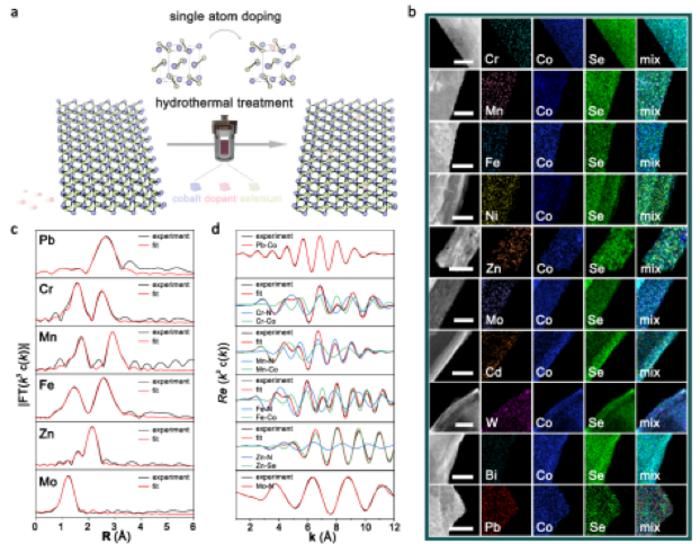A group headed by Academician Shuhong Yu from the Chinese Academy of Sciences’ (CAS) University of Science and Technology of China (USTC) offered a comprehensive technique for the synthesis of 10 single-atom doped CoSe2-DETA (DETA = diethylenetriamine) nanobelts.
 Characterization of single-atom doped CoSe2-DETA nanobelts. Image Credit: Wu et al.
Characterization of single-atom doped CoSe2-DETA nanobelts. Image Credit: Wu et al.
The scientists tweaked the doped single-atom ions and altered the electronic structure to improve the products’ hydrogen evolution reaction (HER) activity. This study was published in the journal Nature Communications.
Hydrogen has the ability to replace fossil fuels as renewable and clean energy, and creating “green hydrogen” using HER could be a smart method to embrace a hydrogen-supporting society. The precious metal platinum (Pt) has an unusual electronic structure, which means that Pt and Pt-based compounds are currently the only commercially available HER electrocatalysts.
The exorbitant cost and scarcity, however, limit large-scale commercial applications. As a result, developing low-cost HER electrocatalysts with high catalytic activity and stability is essential.
Catalysts’ intrinsic qualities can be improved by optimizing their electronic structure. Among these, introducing heteroatoms into the material lattice via ion doping is a viable way to optimize HER performance. This method modifies the electronic structure and affects the local coordination, which increases catalytic performance.
Although earlier reported ion-doped electrocatalytic materials exhibit remarkable HER performance due to the introduction of isolated metal atoms, their lack of a general strategy leads to inadequate modulation of catalyst microstructures, hindering research into the relationship between their properties and structures.
As a result, developing efficient and stable ion-doped HER catalysts with obvious structure-property connections remains difficult.
Cobalt diselenides (CoSe2) have an electronic structure comparable to Pt and are frequently explored as a substitute for Pt for catalyzing HER reactions, but their activity and stability are still inferior to Pt and Pt-based materials.
As a result, a universal synthetic methodology for such catalysts with high-efficiency HER performance needs to be investigated further. Researchers created a generic single-atom doping technique for the synthesis of 10 single-atom doping products by replacing Co with other cations in this study.
The local coordination of the products can be modified using different doping atomic systems to achieve controllable adjustment of electronic structures and HER behaviors over a large range.
The experimental results revealed that the optimal doped product’s catalytic activity is comparable to that of commercial Pt/C. (40 wt%). The overpotential necessary to achieve a current density of 10 mA/cm2 is only 74 mV, with a Tafel slope of 42 mV/dec calculated from the polarization curve.
Furthermore, accelerated voltammograms (CVs) cycling experiments demonstrated the catalysts’ long-term stability. The activity of the catalysts remains nearly constant across 1000 CVs cycles, and the product can run reliably for 20 hours at a constant current density of 10 mA/cm2.
The synchrotron spectroscopy results revealed that the coordination environment of the Co atoms (ratio of Co-N bonds to Co-Se bonds) in the product varied with dopant atoms. Furthermore, a volcano-shaped relationship was summarised between the coordination environment and the product's HER activity, revealing the structure-property relationship of doped CoSe2.
This study presents a new method for the design and synthesis of high-efficiency catalysts, with the optimal products predicted to replace existing Pt/C catalysts and become perfect electrode materials.
Journal Reference:
Wu, R., et al. (2023). Dopant triggered atomic configuration activates water splitting to hydrogen. Nature Communications. doi.org/10.1038/s41467-023-37641-3.